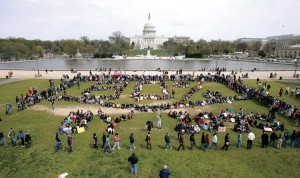Paris Agreement Closer to Ratification
April 28, 2016
Last Friday, April 22—Earth Day—representatives from 175 countries signed the Paris Agreement at the United Nations headquarters in New York City. The agreement stated that each country would voluntarily monitor and reduce greenhouse gas emissions. This agreement, which was developed in Paris, France, at the end of 2015, will be the most comprehensive climate change treaty ever—should it enter into force.

People gather for a climate change protest in front of the U.S. Capitol in Washington, D.C.
Credit: © Hyungwon Kang, Reuters/Landov
Global warming is an increase in the average temperature at Earth’s surface, usually used to refer specifically to the warming observed since the mid-1800’s. Much of the warming that has occurred is due to a process called the greenhouse effect. In the greenhouse effect, certain gases in the atmosphere, such as carbon dioxide, trap heat from the sun. They act much like the glass roof and walls of a greenhouse. Since the mid-1800’s humans have been releasing more carbon dioxide and other greenhouse gases into the atmosphere, mainly though the burning of fossil fuels. Scientists think these extra greenhouse gases are strengthening the greenhouse effect and causing the climate to warm. If it continues, global warming could cause extreme weather, flooding of coastal regions, and massive environmental changes.
The signing ceremony set a record for most signatures on a UN treaty on a single day. Signing the treaty is only the first step toward it becoming binding, however. State governments must now ratify the treaty, a processes that could take years. The treaty will go into effect once at least 55 countries that together produce at least 55% of global carbon emissions ratify it.
Even if the treaty is ratified, it will be up to individual nations to lower their greenhouse gas emissions. The treaty will require countries to assess and report their emissions levels every five years, but what they do with that information will be up to them. Climate change activists are hoping that the process encourages the countries to significantly curb their emissions. They hope the Paris Agreement will help keep global temperatures below 3.6 °F (2 °C) higher than their averages in the 1800’s. Scientists think that some of the most harmful effects of climate change can be prevented this way.


